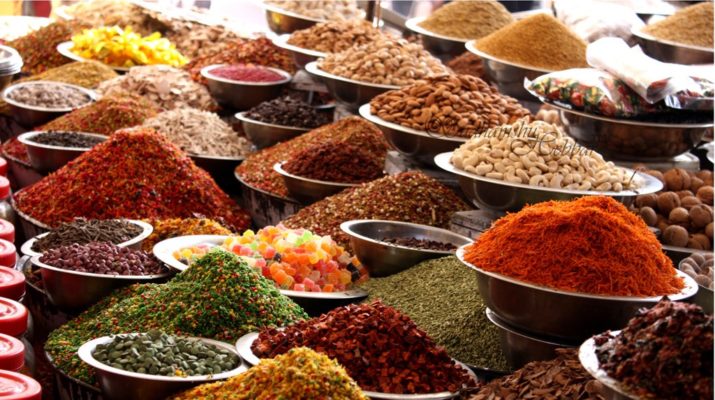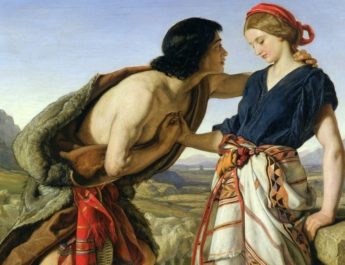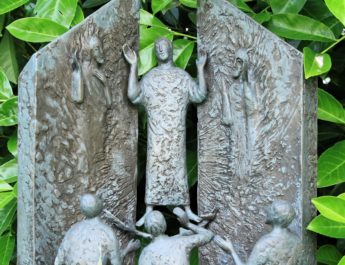Song of Songs 4:9-15
A Women’s Lectionary – Fifth Sunday after Epiphany B
9 You have ravished my heart,A my sister,B my bride,C
A “ravished my heart” = labab. 5x in OT. This is to encourage. Properly, it is to be encased as with fat. Used in a good sense, this means to transport someone with love. Used in a bad sense, it can mean to dull one’s senses.
B “sister” = achot. From the same as ach (brother, kindred, another, other, like). This is sister in a literal or figurative sense. It can also mean another or together.
C “bride” = kallah. Perhaps related to kalal (to complete, perfect). This is bride or daughter-in-law and the term is used before and after marriage.
you have ravished my heart with aD glance of your eyes,E
with oneF jewelG of your necklace.H
D “a” = echad. Perhaps from achad (to unify, continue on a path; figuratively, to gather one’s thoughts). This is the number one, first, united. It can also be alone, altogether, a certain, a few.
E “eyes” = ayin. This is eye in a literal or figurative sense so eye, appearance, favor, or a fountain (the eye of the landscape).
F “one” = echad. Same as “a” in v9. See note D above.
G “jewel” = anaq. 3x in OT. From anaq (necklace, ornament, chain). This is to encircle like a necklace or function as a necklace. Figuratively, it can be to furnish with supplies.
H “necklace” = tsavvar. Perhaps from tsur (to confine, cramp, or bind in a literal or figurative sense; to besiege, assault, or distress, adversary). This is the neck or the back of the neck.
10 How sweet isI your love,J my sister, my bride!
how much better isK your love than wine,L
I “sweet is” = yaphah. 7x in OT. This is to be beautiful, decorate. Root means being bright, which implies being beautiful.
J “love” = dod. This may come from a word that means to boil. It is love or lover. It can also refer to one who is beloved, like an uncle, or a love-token.
K “better is” = tob. This is to be good, go well, please.
L “wine” = yayin. Root may mean to effervesce, referring to the fermentation process. This is wine, grape, or banquet. It can imply intoxication.
and the fragranceM of your oilsN than anyO spice!P
M “fragrance” = reyach. From ruach (to blow, breath; smell, anticipate; figuratively, to perceive, understand). This is a scent or breath – a savor, ointment. It is also used for the odor of sacrifices that pleases God.
N “oils” = shemen. From shamen (to shine, which implies being oily, growing fat). This is fat, oil, grease, olive oil – often with perfume. Used figuratively for fertile, lavish, rich.
O “any” = kol. From kalal (to complete). This is all or every.
P “spice” = bosem. From the same as basam (spice, balsam tree). This is balsam, spice, perfume, odor, the balsam tree.
11 Your lipsQ distillR nectar,S my bride;
honeyT and milkU are under your tongue;V
Q “lips” = saphah. This is lip, edge, border, bank – used for a boundary. It can also be speech or language.
R “distill” = nataph. 18x in OT. This is to drip, ooze, or drop. It can also refer to the process of gradual distillation that causes liquid to fall drop by drop. Figuratively, it can mean prophesying or inspired speech.
S “nectar” = nopheth. 5x in OT. Perhaps from nuph (to rock back and forth, wave, sprinkle, quiver, beckon, offer, present). This is dripping as honey flowing from a honeycomb.
T “honey” = debash. Root may mean being gummy. This is honey or honeycomb because it is so sticky. It can also refer to syrup.
U “milk” = chalab. Perhaps from the same as cheleb (fat, finest, marrow; fat in a literal or figurative sense; the richest or best part). This is milk or cheese or suckling.
V “tongue” = lashon. This is tongue, talker, language, or wedge. It can also be a tongue of flame or a water cove.
the scentW of your garmentsX is like the scent of Lebanon.Y
W “scent” = reyach. Same as “fragrance” in v10. See note M above.
X “garments” = salmah. 16x in OT. From simlah (mantle, clothes, wrapper); perhaps from semel (image, figure, likeness). This is the same word as simlah with the letters transposed. So, this is clothing, a cloak, or mantle.
Y “Lebanon” = Lebanon. Perhaps related to “ravished my heart” in v9. From laben (to be white, make white, make bricks) OR form Aramaic lebab (heart); corresponding to Hebrew lebab (heart, courage, one’s inner self, the mind, or the will); from labab (see note A above). This is Lebanon. The sense of “white” comes from the snow on the top of its mountains. See https://en.wikipedia.org/wiki/Lebanon
12 A gardenZ lockedAA is my sister, my bride,
a gardenBB locked, a fountainCC sealed.DD
Z “garden” = gan. From ganan (to put a hedge around – generally, protect or defend; to cover or surround). This is a garden in that it is fenced in. It can also be an enclosure.
AA “locked” = na’al. 8x in OT. This is properly to secure with a bar or cord. It is to lock, bolt, enclose, or to secure with a cord i.e. to put on a sandal.
BB “garden” = gal. From galal (to roll, roll away, wallow, commit, remove; rolling in a literal or figurative sense). This is a wave, billow, rock pile, something rolled, a spring of water.
CC “fountain” = mayan. Related to “eyes” in v9. From ayin (see note E above). This is a spring, well, or fountain. Figuratively, this is a source of contentment.
DD “sealed” = chatham. To seal, close up, shut, stop, bring to an end. It is used especially for affixing a seal.
13 Your channelEE is an orchardFF of pomegranatesGG
EE “channel” = shelach. 8x in OT. From shalach (to send, send for, forsake, give a slave freedom). This is a weapon, spear, defense, plant, shoot, branch, missile.
FF “orchard” = pardes. 3x in OT. Of foreign origin. This is a preserve or an orchard.
GG “pomegranates” = rimmon. Of foreign origin OR from ramam (to rise in a literal or figurative sense; to get up or exalt). This is a pomegranate or a decoration in that shape. It can also refer to the pomegranate tree.
with all choicestHH fruits,II
hennaJJ with nard,KK
HH “choicest” = meged. 8x in OT. This is something of value or excellent. It is usually a product or produce.
II “fruits” = peri. From parah (to bear fruit, grow, be fruitful, increase; bearing fruit in a literal or figurative sense). This is fruit or reward.
JJ “henna” = kopher. 17x in OT– including covering Noah’s ark with pitch in Genesis 6. From kaphar (to appease, cover, pacify, cancel, cleanse, pardon). This is ransom, bribe, price of a life. Properly, it means something that covers something else. So, it can be a village, bitumen as a coating, a henna plant that dyes, or a ransom price.
KK “nard” = nerd. 3x in OT. This is spikenard or perfume.
14 nard and saffron,LL calamusMM and cinnamon,NN
with all treesOO of frankincense,PP
LL “saffron” = karkom. 1x in OT. This is saffron or the crocus.
MM “calamus” = qaneh. Perhaps from qanah (to get, buy, redeem, create, possess). This is reed, branch, stalk, beam, or measuring rod.
NN “cinnamon” = qinnamon. 3x in OT. Perhaps of Phoenician origin OR from a word meaning to erect. This is cinnamon. See https://en.wikipedia.org/wiki/Cinnamon
OO “trees” = ets. Perhaps from atsah (to shut, fasten, firm up, to close one’s eyes). This is tree or other things related to trees like wood, sticks, or stalks. It can also refer to wood products like a plank or staff or gallows. Additionally, this can refer to a carpenter.
PP “frankincense” = lebonah. Perhaps related to “Lebanon” in v11. From laban (white); from laben (see note Y above). This is frankincense – it may be because it is white itself or because its smoke is.
myrrhQQ and aloes,RR
with all chiefSS spices—
QQ “myrrh” = mor. 12x in OT. From marar (to be bitter, embittered, weep, troubled). This is myrrh as liquid and bitter.
RR “aloes” = ahalim. 4x in OT. This is wood or sticks of aloe.
SS “chief” = rosh. This may come a word that means to shake. It is the head, captain, or chief. It can also be excellent or the forefront. It can be first in position or in statue or in time (i.e. the beginning).
15 a gardenTT fountain, a wellUU of livingVV water,WW
and flowing streamsXX from Lebanon.
TT “garden” = gan. Same as “garden” in v12. See note Z above.
UU “well” = beer. From baar (to make plain; to dig; can also mean to engrave or figuratively to explain). This is a well or pit.
VV “living” = chay. From chayah (to live or keep alive literally or figuratively). This is alive, living, lifetime. It can also be used to describe someone’s age. It can refer to animals, plants, water, or a company or congregation of people. It is life in a very broad sense.
WW “water” = mayim. This is water, waters, or waterway in a general sense. Figuratively, it can also mean juice, urine, or semen.
XX “streams” = nazal. 16x in OT. This is to drip or flow, pour down, flood, distill, or melt.
Image credit: “Spices from Gujarat” by Sudhamshu Hebbar, 2009.




